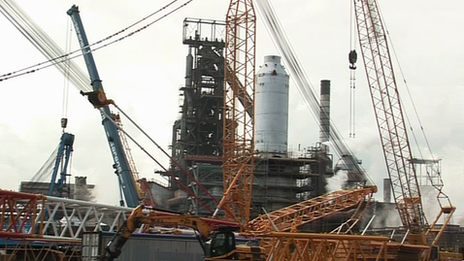Tata Steel blames 'sliding demand' for £50m quarterly losses
- Published

A blast furnace at Port Talbot reopened this week after a £185m rebuild
Steel maker Tata, which employs 7,500 people in Wales, has reported a big rise in losses in its European operations.
Figures for the final three months of 2012 show a loss of £50m in one of the key measures of earnings.
This compares with a loss of just under £5m for the previous quarter.
"Sliding demand was a key problem for European steelmakers in 2012," said the company, which has reopened a blast furnace in Port Talbot costing £185m.
The reported loss of £50m, external in one of the key measures of earnings called Ebitda (earnings before interest tax depreciation and amortisation).
But it is lower than the £91m in losses made in the same quarter a year ago.
Karl Kohler, the managing director of Tata Steel in Europe, said: "With the restart of the No4 blast furnace at Port Talbot this week, we have regained our normal operational and logistical flexibility, enabling us to improve our delivery performance and our service to customers."
Tata Steel globally also made a third quarter loss after tax of £89m, which was higher than expected.
'Difficulty'
The European division makes up more than half of the overall steel business.
Production is in the process of being ramped up at a new blast furnace at Tata's Port Talbot works. The £185m investment is the biggest to have been carried out at the site in decades.
This week, the firm's manufacturing director Ian Hobson said it will help increase production closer to its target of 5m tonnes of steel a year.
The company says the site has been losing millions of pounds but a rise in production should improve the financial performance by helping it absorb the huge overheads that remain the same no matter how much steel is being produced.
The industry has also been affected by reductions in prices, but Tata says conditions are easing, if only slightly.
Mr Hobson said: "It's not improving as much as I'd like it to.
"The difficulty with the steel industry is that on the one hand you've got the price of steel, and on the other hand you've got the price of raw materials, so we have to balance the incoming price of raw materials with the sale price of steel.
"Overall the balance is improving slightly. It's better than it was in November which is one of the reasons the furnace is coming on now, so we have seen an improvement in our gross margins."
The start of production at the blast furnace comes at the same time that Tata is carrying out its biggest single round of job cuts in more than 20 years in Port Talbot.
More than 500 job losses across Wales were announced at the end of last year, mostly at Port Talbot.
Earlier this week, Mr Kohler said the flagship investment was part of the company's strategy for long-term competitiveness.
It gave the Port Talbot plant the capacity for making more than 4m tonnes of steel a year.
"The efficiency and sustainability of the new furnace will also make a major contribution to our efforts to create an 'all-weather' company in Europe," said Mr Kohler.
"We have been able to take advantage of a period of low steel demand to carry out this major engineering project and we are still operating today in an intensely challenging commercial environment."
- Published12 February 2013
- Published14 December 2012
- Published24 November 2012